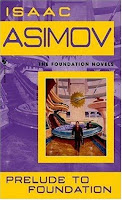Now, after having read the Foundation prequels as well, I would say that one might be better off just going through the original trilogy and leaving it there. You won't get a conclusion to Seldon plan (though how much do you get even with the sequels?) but you will keep the series separated from the 0th Law of Robotics. The trilogy will stay as a centuries spanning galactic struggle just among humans. These two prequels do at least bring back the Encyclopedia Galactica epigraphs I missed in the sequels.
Prelude to Foundation
Prelude to Foundation is set on the Galactic Empire's capital planet Trantor where 30-year-old mathematician Hari Seldon has just presented his psychohistory as a way to predict future. He doesn't consider it to be practical but that doesn't prevent the Emperor getting interested -- what kind of ruler wouldn't want to know what's to come?
Seldon immediately becomes an unwilling participant in political scheming and starts on a flight all over the fully domed, 45-billion-people planet. Along the way Seldon meets various people that become important in developing psychohistory.
I found it interesting that Seldon didn't actually yet have a conjecture himself. Instead, that the Galactic Empire is dying, is suggested to him by reporter Chetter Hummin who helps Seldon against some goons early in the book.
When the possible origins of humanity and robots started getting mentioned -- I guess all that information hadn't been yet erased like in the sequels centuries later -- I immediately realized who Hummin actually was. I don't know what I expected from the prequels but them just being more of the robot stuff felt lame to me.
It is funny that even though I figured Hummin's ultimate secret identity so quickly, I didn't realize he's also another character in the book until it was properly suggested. I guess I thought that I wouldn't need to consider such a possibility anymore. There was also a character whose true nature was only revealed in the following novel but I guessed it in this one already. Asimov's hints were quite obvious.
I read Prelude to Foundation in English out of curiosity and found it an easy read: no difficult prose or words.
Forward the Foundation
In Forward the Foundation, psychohistory is slowly developed into a practical tool of predicting and guiding large populations. It is not a glorious journey: Trantor and the Empire are decaying. There is unrest, political schemes, and lack of funding. The book periodically jumps a decade ahead and Hari Seldon starts worrying about his own passing years. Will he get to see psychohistory finished?
The finish line gets crossed in the end, even if barely. Both Foundations set off quite haphazardly on their tasks. In the original trilogy I definitely had the impression that Seldon had planned stuff out more, given all his messages that are played decades later at set dates.
I also got the feeling that Hari Seldon became Isaac Asimov's literary alter ego as the author himself started to be of quite venerable age at the time of writing the novel. Forward the Foundation was in fact published posthumously in 1993 after Asimov passing away in 1992 at the age of 72.



No comments:
Post a Comment